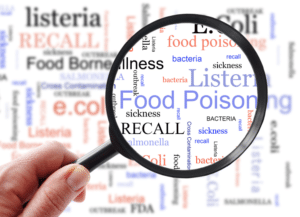Food Poisoning | Sign & Symptoms
Food poisoning, also known as foodborne illness, occurs when contaminated food or beverages are consumed, leading to various symptoms ranging from mild discomfort to severe illness. Recognizing the signs and symptoms of food poisoning is crucial for timely intervention and proper management.
Signs and Symptoms of Food Poisoning:
1. Nausea:
Nausea is a common early symptom of food poisoning, characterized by a sensation of unease or discomfort in the stomach. It often precedes vomiting and may persist for several hours or days.
2. Vomiting:
Vomiting is the body’s natural response to expel harmful substances ingested through contaminated food. It helps rid the digestive system of toxins and pathogens, but frequent vomiting can lead to dehydration.
3. Diarrhea:
Diarrhea is another typical symptom of food poisoning, characterized by loose or watery stools. It occurs as the body attempts to flush out toxins or pathogens from the gastrointestinal tract. Severe diarrhea can lead to dehydration and electrolyte imbalances.
4. Abdominal Pain:
Abdominal pain or cramps are common symptoms of food poisoning, often accompanied by bloating or discomfort. The pain may range from mild to severe and can be localized or diffuse.
5. Fever:
Fever is the body’s response to infection and inflammation caused by foodborne pathogens. Elevated body temperature helps the immune system fight off the invading microorganisms. Fever most of the time, is accompanied by chills and sweating.
6. Headache:
Headaches are a frequent complaint among individuals with food poisoning. They can be caused by dehydration, electrolyte imbalances, or the body’s inflammatory response to toxins or pathogens present in contaminated food.
7. Fatigue:
Fatigue or tiredness is common during poisoning, as the body expends energy to combat the infection. Individuals may feel weak, lethargic, or exhausted, making it difficult to perform daily activities.
8. Muscle Aches:
Muscle aches or myalgia may occur as a result of food poisoning, particularly if the illness is accompanied by fever or dehydration. The muscles may feel sore, tender, or stiff, making movement uncomfortable.
9. Loss of Appetite:
Food poisoning can lead to a loss of appetite due to nausea, vomiting, and abdominal discomfort. Individuals may have difficulty eating or may avoid food altogether until the symptoms subside.
10. Dehydration:
- Dehydration is a serious complication of food poisoning, especially if vomiting and diarrhea persist. Signs of dehydration include thirst, dry mouth, reduced urine output, dark urine, dizziness, and weakness. Severe dehydration requires immediate medical attention.
11. Weakness:
Weakness or generalized malaise may accompany food poisoning, particularly during the recovery phase. It may take time for the body to fully recuperate and regain strength after experiencing the debilitating effects of the illness.
12. Neurological Symptoms:
In severe cases of food poisoning caused by certain toxins or pathogens, neurological symptoms may occur. These can include confusion, dizziness, blurred vision, tingling sensations, numbness, or even seizures. Neurological symptoms warrant urgent medical attention.

Preventing Food Poisoning:
In addition to recognizing the signs and symptoms of poisoning, it’s essential to take preventive measures to reduce the risk of contamination:
- Practice proper food hygiene, including washing hands before handling food and keeping utensils and surfaces clean.
- Cook foods thoroughly, especially meat, poultry, eggs, and seafood, to kill harmful bacteria.
- Store food at the correct temperatures to prevent bacterial growth.
- Avoid cross-contamination by keeping raw and cooked foods separate.
- Use safe water sources for drinking and food preparation.
- Be cautious when consuming raw or undercooked foods, especially sushi, shellfish, and unpasteurized dairy products.
- Refrigerate leftovers promptly to prevent bacterial growth.
Also Read: Glutamine: Benefits, Side Effects, And More
Conclusion:
Recognizing the signs and symptoms of poisoning is essential for prompt treatment and prevention of further complications. If you or someone you know experiences any of these symptoms after consuming food or beverages, it is important to seek medical attention promptly.
Additionally, practicing food safety measures can help prevent foodborne illnesses and promote overall health and well-being.
Frequently Asked Questions (FAQs) About Food Poisoning:
-
What are the less common symptoms of poisoning that people might overlook?
- While nausea, vomiting, and diarrhea are widely recognized symptoms of food poisoning, less common symptoms may include neurological symptoms like confusion, dizziness, or tingling sensations, as well as muscle aches, weakness, and even dehydration. These symptoms can sometimes be overlooked or attributed to other causes, so it’s essential to be aware of the full spectrum of signs associated with foodborne illness.
-
Can food poisoning occur from consuming food that appears fresh and safe?
- Yes, food poisoning can occur even from food that appears fresh and safe. Contamination can happen at any stage of food production, processing, or preparation. Bacteria like Salmonella and E. coli, for example, may be present in raw meat or poultry and can cause illness if not properly cooked. Similarly, fruits and vegetables can be contaminated with harmful bacteria during growing, harvesting, or handling processes.
-
Is food poisoning always caused by bacteria, or can other pathogens be responsible?
- Food poisoning is caused by various pathogens, including, viruses, bacteria, parasites, and toxins. While bacterial contamination is a common cause, viruses like norovirus and hepatitis A, as well as parasites such as Giardia and Cryptosporidium, can also lead to foodborne illness. Additionally, toxins produced by certain bacteria, such as Staphylococcus aureus and Clostridium botulinum, can contaminate food and cause poisoning.
-
What are some misconceptions about food poisoning that people often have?
- One common misconception is that food poisoning only occurs from consuming spoiled or visibly contaminated food. In reality, contamination can occur without visible signs, and even fresh-looking food can harbor harmful pathogens. Another misconception is that poisoning is always mild and self-limiting. While many cases resolve on their own, severe food poisoning can lead to complications requiring medical attention, especially in vulnerable populations like young children, elderly individuals, and those with weakened immune systems.
-
How can I differentiate between food poisoning and other gastrointestinal illnesses?
- Distinguishing between food poisoning and other gastrointestinal illnesses can be challenging, as many share similar symptoms. However, certain factors, such as a recent history of consuming potentially contaminated food, multiple people experiencing symptoms after eating the same meal, or known outbreaks of foodborne illness, may point to food poisoning. If symptoms persist or worsen, seeking medical advice and possibly testing for specific pathogens can help confirm the diagnosis and guide appropriate treatment.






